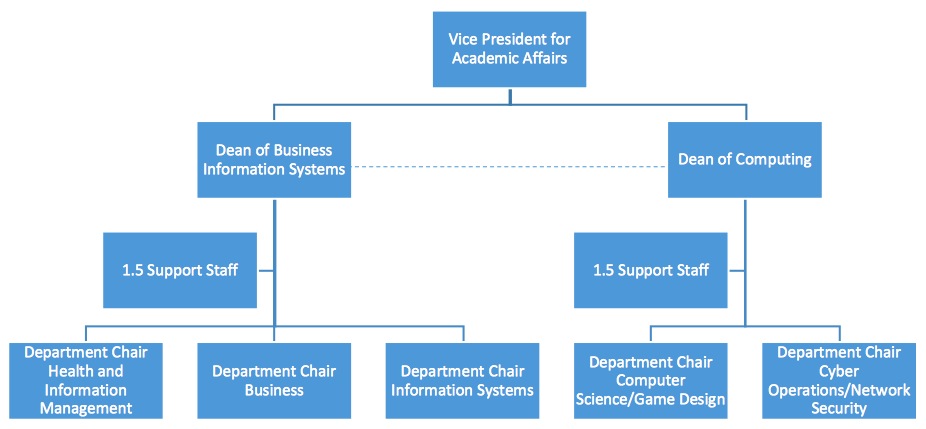The South Dakota Board of Regents meet this week Tuesday and Wednesday in Sioux Falls at the downtown Holiday Inn. The public agenda seems relatively thin; the Regents will spend the majority of their time (10.5 hours scheduled) behind closed doors discussing personnel matters.
In public, the Regents will consider DSU’s request for mitosis, to calve a new College of Computing from the current College of Business and Information Systems. DSU says other schools are doing it, so so should they. Creating a new College of Computing will “better align faculty within disciplines and colleges who share common goals and curriculum.” And we’ll get “synergy.”
We’ll also get another dean on campus, plus the necessary support staff:

One more dean, another secretary and a half, another department chair (or two?)… that means we’re cutting more checks, right? Maybe new DSU President José-Marie Griffiths will have a chance to undo some of former president David Borofsky’s damage by restoring Tom Halverson and Wayne Pauli to their previous pay grades.
Speaking of Borofsky damage, I see DSU finally picked a new sponsored programs coordinator. Last spring, Borofsky sacked successful grant-getter Mickie Kreidler, even as the Regents were asking for more focus on research. It took DSU until January to promote musician (!), former executive assistant to the DSU president, and former lit instructor Kacie Fodness to the post. Whew—now let’s go get some grants!

These departments are closely enough in purpose that there will be some classes that will be needed by more than one department. This is not a large enough school to hire two profs for these situations. If there is a problem with course content to fill the needs of both departments then to have to go all the way to the top to properly follow the chain of command to rectify such a situation would be to much red tape. A smaller school like DSU should keep it simple by having one dean.
This is a process that has been changing education for a few decades now, and few have noticed. It comes from the same impulse as the attacks on public education. The power structure likes job training, but fears education. Educated people are not as dependent and tractable as those who just worry about scraping out a living. Noem Chomsky has analyzed the matter thoroughly: http://www.alternet.org/corporate-accountability-and-workplace/chomsky-how-americas-great-university-system-getting
Sounds like a waste of money. Maybe these professors could concentrate on education rather than how DSU can line their pockets when they establish their private businesses.
Roger, it does seem odd that a full “university” would need separate colleges for “information systems” and “computing” but can house English, history, and biology in one college.
Dan, who’s got the pocket lining? And whose pockets get lined by this college split?
DSU is perfect candidate to become a community college in a county that should be consolidated with Moody and Brookings Counties.
A word of caution.
I think there can be a lot of reasons to see changes in an academic hierarchy like this, and that makes it hard to speculate. These maneuvers are as complicated and as blackbox as company mergers and the shifting of properties between incorporated holdings. Maybe someone has promised a hefty endowment if a new school of computing is established. Maybe having information systems and business tied together under a dean has led to some administrative issues, and it would easier to create a new computing school and later, quietly, make the business and information studies school just a business school. Maybe there is some little-known BOR policy about course listings and degree requirements that affect only business schools, and the best solution is to split off computing into its own school. Maybe the enrollment of computing has gotten very large, meaning the computing faculty involved now reflect a larger share of earned credit hours, and they don’t want to have to go through the dean of a business school to schedule classes or approve their faculty hiring decisions.
Maybe maybe maybe…
That doesn’t mean it isn’t fun to theorize (and I don’t want to dampen that fun!), but without tape-recordings of faculty meetings, it’ll hard to know what the actual motivation is.
On July 31, 2014 David Borofsky brought the technology faculty together for a mid summer meeting where he announced that he was going to split the current College of BIS into two seperate colleges. This is the result of that. As we now recall, he retired two weeks later amid student and faculty turmoil.
The employee growth in FTE is not that large, we are going from 2.5 FTE Support staff to 3, and from a Dean and Associate Dean to 2 Deans. The Department Chairs will receive a small summer stipend and a 25% (1 class release) from teaching.
Yes, there is a net increased cost for administration with this split, but not as large as it might seem from first look.
The curriculum will be shared from program to program and college to college. As an example I teach a course that is actually used in all 3 existing colleges and will be in all four once approved by the BOR.
Thanks, Wayne! I wondered how many of the FTEs on that chart already existed in East Hall. Can you tell us, Wayne, what practical difference this organizational change will make for students and faculty? (Use the word synergy sparingly and cautiously!)
Cory, with the very substantial growth in the Computer Science and Computer Security area the faculty and students in these areas wanted leadership,that was very in tune with their needs. That is what we had prior to June 12 and 13 of 2014. the Students and faculty in the “soft skills” areas of Business and Information Systems want a leader that is in tune with their disciplines, so when Borofsky made the changes last year at the request of the soft skills folks the CS folks balked. We all know the rest of the story (Paul).
so, this two college creation gives both groups what they want. Computing will continue to grow and we hope that the BIS programs will get back to where they were a decade ago, as they have lost student numbers on campus and in Sioux Falls. An interesting time at DSU.